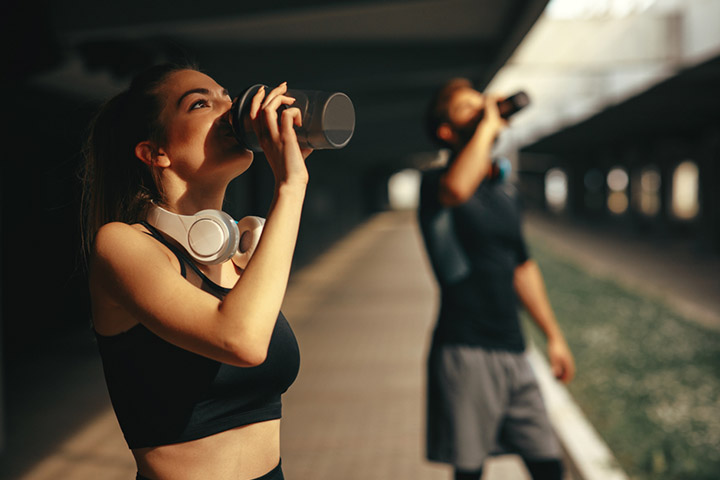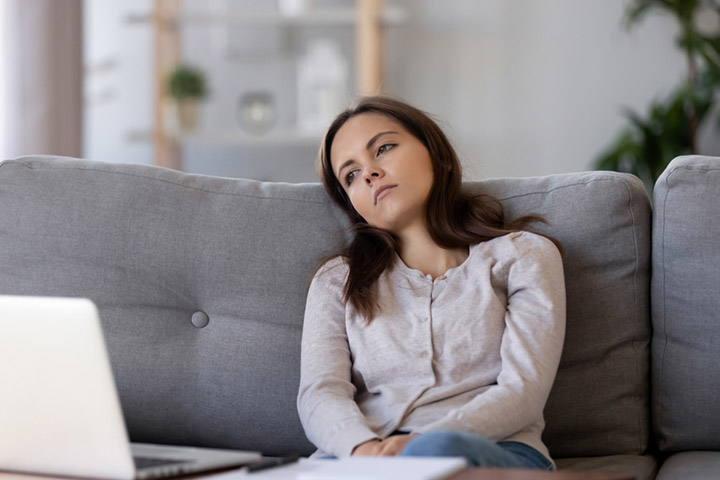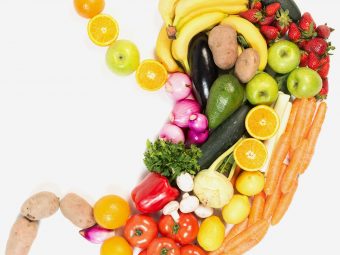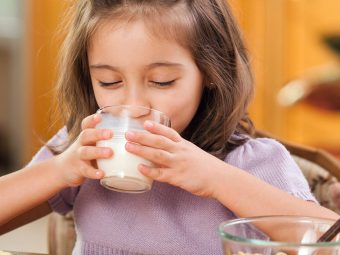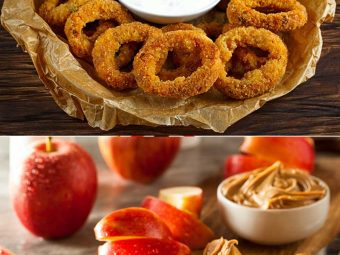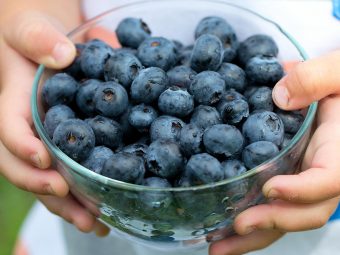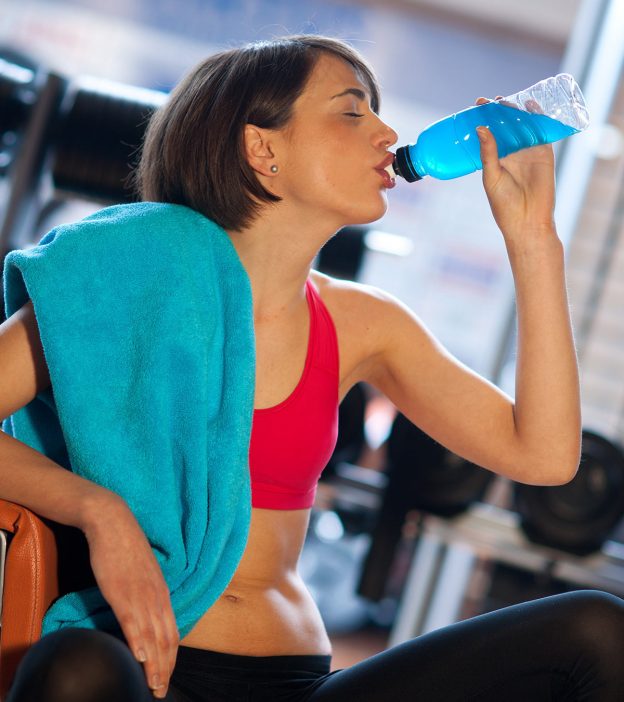
Image: Shutterstock
Regularly consumed, the effects of energy drinks on teenagers can be dangerous. While many claim to be all-natural, they aren’t. Energy drinks are loaded with caffeine and sugar, which can negatively affect health in the long run(1).
Without thorough research, it’s impossible to decide if it’s safe for teens to consume energy drinks daily, before or after playing a sport or an activity, or better sports performance.So, instead of making it a habit to intake energy drinks that appear on the store shelves, parents need to swap them with homemade beverages with natural ingredients known to boost energy and keep the sugar levels stable.
To help you understand the side-effects of energy drinks on teenagers, we have put together some information below. Read on to find more.
Types Of Energy Drinks
Energy drinks could be of two types:
- Drinks that come in containers, similar to soft drink
- Energy shots that come in small containers
In both the categories, caffeine is a major component. According to the American Academy of Pediatrics, energy drinks contain a high amount of caffeine and stimulant substances, which should not be present in the regulardiet of teenagers(2).
Why Teenagers Might Like To Drink Energy Drinks?
Image: Shutterstock
Energy drinks can provide some immediate benefits. According to the Harvard T.H. Chan School of Public Health, controlled trials do show an improvement in the performance of young athletes due to energy drinks. But the institution states, “the majority of studies show an association with negative health effects(3).” Energy drinks provide short-term gains in energy and alertness or concentration. But research concludes that the negative effects of energy drinks prevail over the positive short-term benefits.
A study on the perception of energy drinks in the UK found that taste, promotion, price, ease of access, and peer influences are the major factors that influence the consumption of energy drinks among children and young people(4). It was noted that manufacturers indulged in‘value-for-money’ pricingand other营销活动that might make the beverage attractive.
The researchers concluded that “The lack of a single dominant factor suggests that there is unlikely to be a ‘silver bullet’ in attempting to address this issue.” It means there is no single reason why energy drinks are appealing. A combination of several factors, along with ease of availability andpeer pressure, is the likely reason why teens are attracted to energy drinks. It makes it even more essential for teenagers and their parents to understand the side effects of energy drinks.
 Quick fact
Quick factSide Effects Of Energy Drinks On Teenagers
According to the US National Center for Complementary and Integrative Health, consuming energy drinks could have negative effects on the health of a teenager(1). High amounts of caffeine and additives in energy drinks can be harmful to teenagers’ health.
Here are a unfavorable effects of regular energy drink consumption:
- According to a report, teenagers who regularly take energy drinks might have a risk ofsleep issues, poor learning, and poor performance. There could be a higher risk of using drugs, cigarettes, or alcohol(5).
Image: Shutterstock
- Shobha Bhaskar, a pediatric hospitalist at St. Louis Children’s Hospital, says that energy drinks are poor in nutrition, rich in sugar content, and high in caffeine. Drinking these beverages regularly could beharmful to teenagers(6).
 Be watchful
Be watchful- According to research by Chapman University, 40% of teenagers (aged 13-19) that consume energy drinks experience side effects such as insomnia, increased heart rate, nausea and vomiting, jitters, headache, andabdominal pain. In some extreme cases, the teenager mayexperience seizures(7). The additives in these drinks that intensify the effect of caffeine, may cause anxiety and if consumed regularly the stimulant effect of these beverages may also lead to an addiction(6).
- The National Institutes of Health states that consuming high amounts of energy drinks maydisrupt the sleeping patternsand might also increaserisk-taking behavior(drug use, tobacco use, fighting)(8).
Image: Shutterstock
- Energy drinks containguaranaiXA plant native to the Amazon rainforest, the seeds of which contain caffeine and are used in energy drinks, caffeine,creatineiX一种自然产生的是ino acid derivative that helps supply energy to muscles, ginseng,taurineiXA naturally occurring amino acid in the body and also found in some foods, and different amounts of vitamins, protein, carbohydrates, amino acids, and minerals. A mix of these compounds, along with caffeine, canlead todehydrationsince caffeine isdiureticiXA medication or substance that increases urine production(9).Jesse Feder, a certified personal trainer and strength and conditioning specialist from North Miami Beach, Florida, says, “Since energy drinks usually contain high amounts of caffeine, your body will most likely need to urinate more frequently. Caffeine is a natural diuretic which helps rid your body of salt and fluids. Therefore, energy drinks will deplete the electrolytes in your body.”
- According to the University of Utah, energy drinks may contain more than 500mg of caffeine, which is equivalent to 14 cans of caffeinated soft drinks(9). Such an amount of caffeine can be associated withcaffeine toxicity.
- Certain energy drinks couldcontain alcohol. The manufacturers of alcoholic energy drinks do not include caffeine and other stimulants due to a ban by the US Food and Drug Administration(10). However, these drinks are still sold as ‘energy drinks’ since the drinks are reformulated with no added stimulants(11).
 Experts say
Experts sayNote that there is an increased risk of these side effects only if the teen drinks the energy drinks regularly. A can of it occasionally may not cause any serious problems.
How Much Energy Drinks Can Teenagers Drink?
There is no designated safe limit of energy drinks for teenagers.
Frequently Asked Questions
1. What is the age limit on energy drinks?
There’s no age limit on the consumption of energy drinks for children and teens(12). However, apex health organizations recommend that children and teens should not consume energy drinks(2).
2. Do energy drinks make me fat?
Occasional intake of energy drinks will not cause weight gain. However, its excessive intake can raise the risk of unwanted weight gain. Energy drinks contain high amounts of sugar. Research shows that consuming too much sugar can cause weight gain and other weight-related health problems(13).
3. Can energy drinks be life-threatening?
“If consumed in excessive amounts, energy drinks can be life-threatening. Excess caffeine and other stimulants can put too much stress on your heart and skyrocket your blood pressure. This may lead to a heart attack and even death. Additionally, energy drinks contain excessive amounts of B-vitamins which can cause things like blurred vision, liver damage, and nerve damage,” observes Feder.
Some kids believe energy drinks help them remain awake and perform better. However, no scientific proof exists that these drinks benefit a teenager’s overall health. Instead, regular usage of these beverages has shown to have a detrimental impact on your teen’s learning and sleep. Also, there could be adverse consequences like dehydration from sugary and caffeine content of energy drinks. So, teach your teen about the effects of energy drinks and urge them to drink water and consume fresh fruit to satisfy the body’s demands while exercising.
Infographic: Adverse Effects Of Energy Drinks On Teenagers
Energy drinks have become increasingly popular among teenagers in recent years. While they may provide a temporary spike in energy, they can have serious adverse effects on the health of teens. Check out the infographic below to learn about some negative impacts that energy drinks have on your teenager’s health.
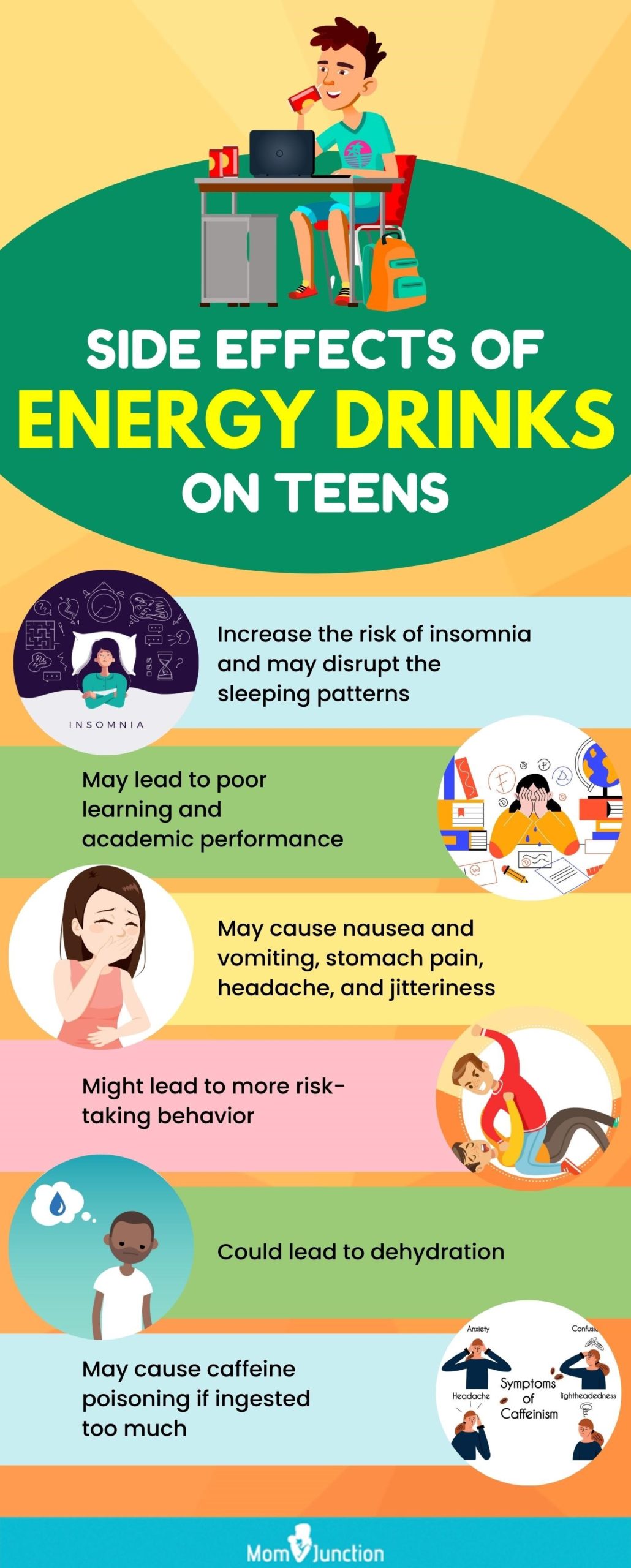
Illustration: Momjunction Design Team
Get high-quality PDF version by clicking below.
Download Infographic
Key Pointers
- Consuming energy drinks is unhealthy due to the presence of stimulants like caffeine.
- Teenagers who frequently consume energy drinks may have a higher risk of developing conditions such as diabetes and heart issues.
- Insomnia, nausea, headaches, and stomach pain are among the potential negative effects of energy drinks.
- The primary factors that influence teenagers’ consumption of energy drinks include taste, promotion, price, accessibility, and peer pressure.
Energy drinks can have a huge impact on teens and young adults. Learn how they can affect your health and wellbeing in this informative video.
References:
2.The Buzz on Energy Drinks; Centers for Disease Control and Prevention
3.Energy Drinks; Harvard T.H. Chan School of Public Health
4. S. Visram et al.,Children and young people’s perceptions of energy drinks: A qualitative study; National Center for Biotechnology Information
5. E. J. Markey et al.,Buzz Kill: A Survey of Popular Energy Drinks Finds Majority of the Market Unwilling to Make Commitments to Protect Adolescents
6. S. Bhaskar;The truth about teens and energy drinks; Childrensmd.org (2015)
7.Energy Drink Use in Teens has Adverse Effects; Chapman University (2018)
8. C. Pennington;The Effects of Energy Drinks on Adolescents; University of Connecticut (2010)
9.Buzz in a Bottle; University of Utah
10.Fact Sheets – Alcohol and Caffeine; US Centers for Disease Control and Prevention
11.The banning of alcoholic energy drinks; American Psychological Association
12.Energy Drinks: Information for Retailers; ACS
13.The Nutrition Source; Harvard Health



